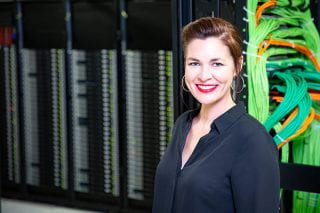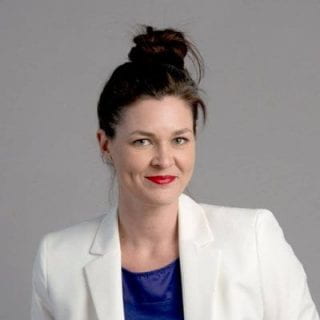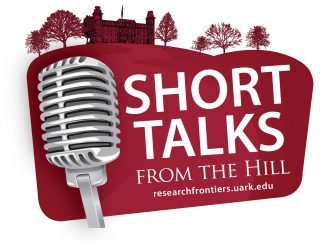A Q&A with Communication’s Stephanie Ricker Schulte
Stephanie Ricker Schulte, Ph.D.
Associate Professor and Associate Chair
Department of Communication
 In this conversation, Schulte talks about her love of Fayetteville, being a Fulbright Scholar, her research on the intersections of technology, popular culture and policy, and her passion for helping students become critical media consumers, ethical media producers and empowered citizens. Be sure to check out the bonus Short Talks podcast with Schulte at the end!
In this conversation, Schulte talks about her love of Fayetteville, being a Fulbright Scholar, her research on the intersections of technology, popular culture and policy, and her passion for helping students become critical media consumers, ethical media producers and empowered citizens. Be sure to check out the bonus Short Talks podcast with Schulte at the end!
Q: Tell us a little about your research, academic passions and/or role within the college. What excites you about this?
I research communication technologies, popular culture and policy. Most of my research focuses on the productive power of ideas on technology and, conversely, the ability of technology to shape how we think.
Recently, I published an article that traced the evolution of the start-up concept. This research investigates how and why the startup—and its key concepts of disruption, entrepreneurism, innovation and productive failure—dominate our current cultural moment and visions for our government.
Similarly, my book (Cached: Decoding the Internet in Global Culture, NYU, 2013) looked at how people made sense of the internet after the 1980s when it began to emerge as a popular technology in the United States and the world.
In this project, I investigated the often-conflicting ways that policymakers and news media imagined the internet—as a toy for teenagers, a national security threat, a new democratic frontier, an information superhighway, a virtual reality, and a framework for promoting globalization and revolution—and how those imaginings differed in other countries.
 Ultimately, this transnational cultural history of the internet shows that ideas matter in material ways. How we thought about the internet shaped how we used it, how we developed it, how we regulated it. How people in other countries thought about the internet allowed it to develop in different ways in different places.
Ultimately, this transnational cultural history of the internet shows that ideas matter in material ways. How we thought about the internet shaped how we used it, how we developed it, how we regulated it. How people in other countries thought about the internet allowed it to develop in different ways in different places.
My goal with this work was to make us a little uncomfortable, to point out that if we fail to look closely at our ideas—our unexamined assumptions about what a technology is and who it serves—we fail to make informed decisions about its future and our future.
Although the research above is primarily solitary, in recent years I have begun to collaborate with faculty on campus and elsewhere. These projects have taken up questions of social media and politics, gaming and education, racial identity, consumerism and advocacy.
Q: How long have you been at Fulbright College? What have you enjoyed most about your time here?
I joined the faculty in 2008 after graduating from the George Washington University in Washington, D.C.
Returning to the University of Arkansas was a homecoming for me. I grew up in Fayetteville, my parents were faculty members, and I also received my undergraduate degree from Fulbright College.
I am delighted I could return to my beloved home state, to my growing alma mater, and especially to my home college.
As a former Fulbright Scholar in Berlin, Germany, I believe deeply in the value of getting outside the perspectives of one’s nationality and culture to see the world differently, in the value of mutual understanding and international exchange.
I’m proud to work in the college that bears Sen. Fulbright’s name.
Q: What do you most hope your students remember from their classes and/or interactions with you?
The majority of my students spend most waking hours interacting with computing technologies (such as mobile telephones and computers) and on communication platforms (such as Instagram, Twitter and YouTube).
Yet, students often do so mindlessly, giving little thought to technologies and platforms that occupy their time, host their social interactions, and shape what they see, know and think about the world.
I hope my classes change that. I hope students emerge from my courses as critical media consumers, ethical media producers, and empowered citizens.
Because I teach about communication technology and try to reach students where they are in the continually evolving media ecology, I rarely have the luxury of reusing material.
As a result, my courses are designed to help students build skills applicable to any platform, those dominant now as well as those emerging in the market.
I assign readings and projects that encourage students to think critically about the platforms on which they communicate and the technologies behind those platforms, the practices those platforms encourage and discourage, the ways platforms track consumers and empower citizens, the ways they intervene in markets, in politics, in social institutions, the companies that own them and advertise through them, as well as the governments that regulate or deregulate them.
I hope my students become more conscious of their technology choices, that they are able to analyze their media habits, to recognize what media they consume regularly and often thoughtlessly, and to understand the intended and unintended effects of those actions.
I also hope they depart with the skills to reshape those habits to better serve their personal, political and professional goals.
Q: What do you like to do during your time outside of the university?
I enjoy reading, cycling, yoga and spending time with my husband and our two children.
Q: What’s up next on the horizon for you?
In addition to my future research projects detailed above, I look forward to continuing my administrative work with the energetic and award-winning Department of Communication faculty.
Next year, the communication department will launch the Center for Communication Research based in a redesigned collaborative lab space that will connect faculty across campus and across the country to produce cutting-edge research.
The communication faculty hope these new research initiatives will be as successful as our recent graduate education innovations.
A few years ago, we redesigned our graduate degree to focus on civic engagement. This redesign led the department to win the 2017 M.A. program of the year by the National Communication Association, the main organization in the discipline.
The faculty is currently redesigning its undergraduate curriculum and the faculty are excited to share our new curriculum with future communication students.
Since communication is one of the fastest growing majors in the college, I look forward to seeing the department build energy and innovate in the years to come.
Editor’s Note: Stephanie Ricker Schulte was also recently featured in the U of A’s Short Talks From the Hill podcast, where she discussed exploring the relationship between ideas and technology. Be sure to check it out below or by visiting Research Frontiers!
Andra Parrish Liwag
Director of Communications, J. William Fulbright College of Arts and Sciences
479-575-4393 // liwag@uark.edu


